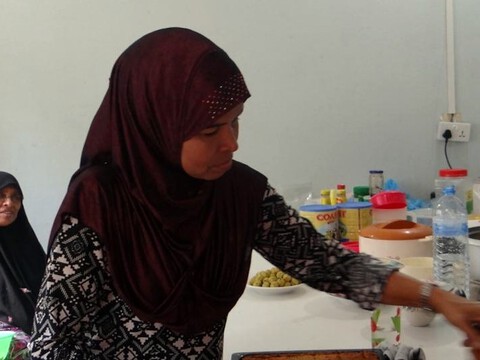Case Studies from Maldives
Case Study 1
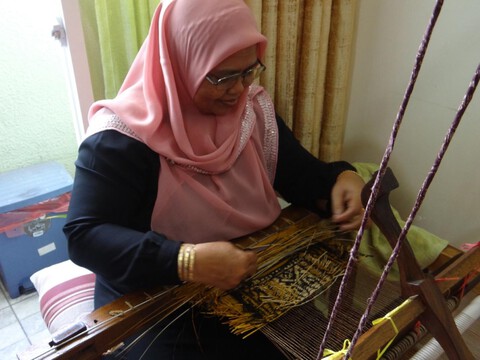
Far away from Male, Gadhdhoo is a small island that’s known for its remarkable mat weaving tradition. Handcrafted largely by women, home-based workers from the Thundukuna community, the woven mats are made with indigenous reeds that are naturally dyed with turmeric and black. It was here, in Gadhdhoo, that Zaeema Hussain Manik learnt mat weaving from her sisters. The skill is part of her heritage and one that she has carried to Male when she moved there 27 years ago.
Male’s compact homes did not allow Manik to bring out her weaving loom. For more than two decades, Manik concentrated on raising a family and it was only two years ago, when she moved to a slightly larger space, that she thought about weaving again, at the age of 54. Now, at her apartment, right next to the open kitchenette, sits her loom. When she is finished with the household chores and also teaching the Quran to young children, Manik uses her deft hands to weave intricate patterns. While she easily produces the classic designs, Manik says that she loves to use her inherent creativity to create new patterns. Today, Manik is one among only a handful of mat weavers in Male.
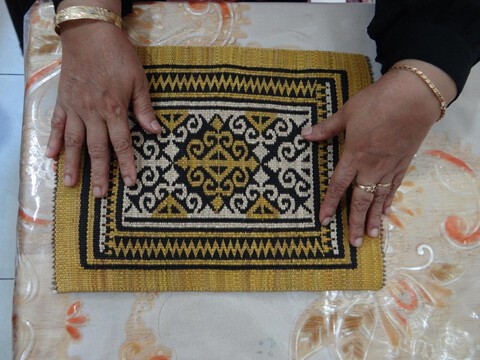
Like many home-based workers, Manik works alone and takes care of all the processes involved in the craft. She sources prepared reeds from Fiyori Islands. In a week, she produces a woven mat that measures around a foot, for this she makes MVR 450 (approx $29). A mat of 1.5 feet usually fetches her around MVR 750 (approx $49) at one of Male’s many souvenir shops.
Manik says that while she (like many of her generation) is passionate about the craft, she doesn’t see it continuing for long since the younger generation is not keen on taking it up. Her own girls, she says, are not interested in learning mat weaving since it is a tedious process that brings little returns.
Organisation affiliated with: Not Affiliated.
Case Study 2
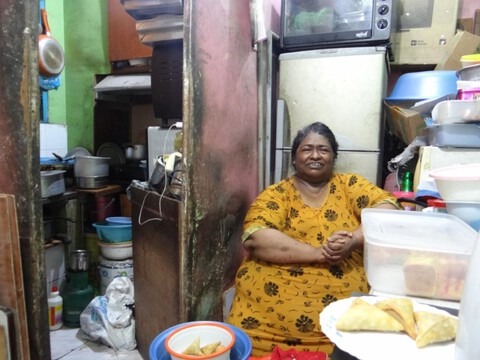
Every evening, streams of customers shuffle in and out of Saleema Hussain’s kitchen cum home. Located on one of Male’s nondescript streets, Hussain’s abode is a well-known address, among Male’s citizens, since she is famed for her hedhikaa - a range of finger foods that are consumed largely as evening snacks.
Hussain has been in the business for over 17 years and she is popular with customers – many of whom have been purchasing her goodies for decades – because she uses the freshest of ingredients. Walk in and you will see Hussain sitting on a chair, in the corner of a cramped room, surrounded by a refrigerator that’s topped with a microwave and storage cabinets that are piled high with the kitchen utensils. At one end of this already busy room is an even smaller kitchen, where Hussain and her husband make the snacks every day. The kitchen too is packed with equipment and stacks of ingredients – leaving enough room for only person to stand. Attached to this space, is a windowless, one-room living quarters where Hussain, her husband and son live. Her daughter too only recently moved after her wedding. After almost 20 years of working, Hussain says this is the best she can afford given Male’s famously notorious rental prices. And Hussain herself pays a hefty MVR 10,000 for this less than convenient place.
Unlike a lot of Male’s citizenry, Hussain says that she was born and brought up in the capital city. She grew up in a much greener Male, she says, bereft of the tall buildings that dot the skyline now. Her parents used to run a local hotel and it was from them that she learnt the ropes of the trade. Like them, Hussain’s day too begins early. She travels to the fish market and sources the freshest of tuna, before returning home to smoke it. It is this flavour, that customers say, is the main draw. With the smoked fish, Hussain makes gulha ( spiced, fish balls), samosas, cutlets, fish cakes and cream buns. In the morning, she sells out by 10.30am and in the evening she starts selling by around four and runs out of stock in two hours. Hussain also caters for parties but says that she is unable to take many large orders because of the lack of kitchen space.
Organisation affiliated with: Not Affiliated.
Case Study 3
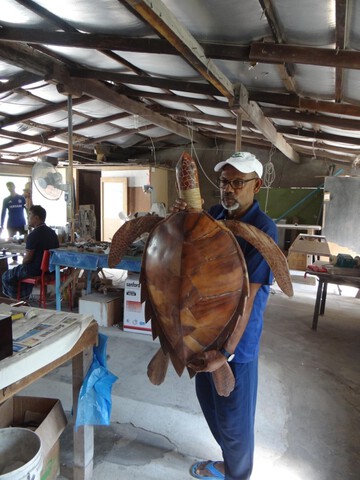
A 40-minute speed boat ride from Male will bring you to the island of Hurra. It’s best known for its ultra-luxury Four Seasons but is also one of those rare islands that’s inhabited by native Maldivians and offers budget stays for tourists as well. Like much of Maldives, Hurra too is a slice of Paradise - made up of white sands and surrounded by turquoise blue waters. Hurra is Mohammed Didi’s home.
Didi spent his first 17 years in Addu after which he travelled to Male as a student. A year later, when the school he was studying in shut shop, Didi trained as an apprentice at a carpentry workshop. At that time – over 40 years ago – Hurra was occupied by the fishing community. With no electricity, no speed boats, and no harbour, the fishermen spent their days on the waters – netting fish and then travelling all the way to Male to sell their catch.
When the Four Seasons came up in Hurra, Didi set foot on the island and took up work in the hotel’s carpentry department. Here, he began a new life – establishing a home and putting down his roots. After ten years at the hotel, Didi decided to employ his skills and embrace home-based work.
He began fashioning home accessories and decor goods with his hands with materials he found in the island and in the sea. He used black corals, oysters, and other prized shells to make beautiful knickknacks for the market. However, when conservation efforts stepped up in Maldives, there was a ban placed on fishing rare ocean fauna. This was when Didi turned his attention to natural, waste material in his island.
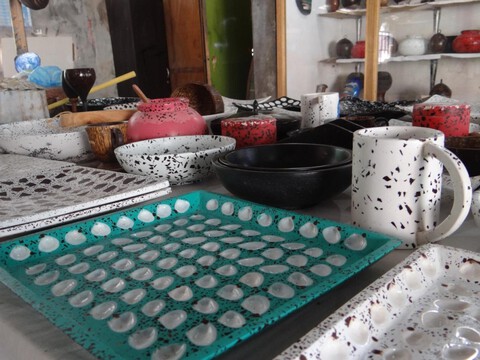
At his workshop in one of the back alleys of Hurra, Didi makes trays, charming jewellery boxes, and serving bowls from coconut shells, powdered sea shells and resins. From the same material he also makes elegant sting rays and dolphins. You can also pick up trinkets like pendants and bangles. Didi hasn’t forgotten the carpenter in him either. There’s a dedicated space in his workshop that churns out giant tortoises made from wood along with goblets and vases.
Didi says that he takes inspiration from Nature and tries to create something from nothing. His best creative ideas come at night, when he is falling asleep. And he brings them with them in the morning and tries to breathe life into them at the workshop with the help of the artists he has nurtured.
Apart from showcasing natural materials in an innovative light, Didi is committed to encouraging local talent. He wants to bring young men from faraway islands and provide them with work opportunities at his workshop. He believes that young men have been lured into working at resorts in the promise of fast cash and an easier life. However, having worked at resorts, he believes that they afford little freedom and that they would have better dignity if they worked as independent artists.
Didi hopes that, in the coming years, he not just fosters an entire generation of artisans but also brings Maldivian artistry to the mainstream in his own country.
Organisation affiliated with: MACCS
Case Study 4
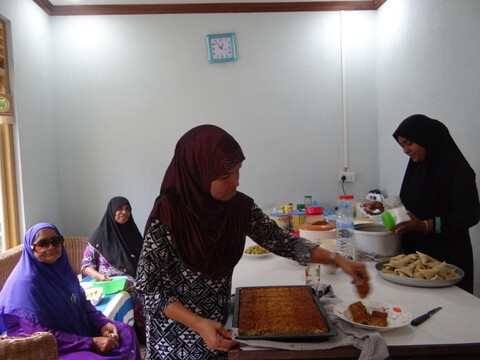
Yumna Mohammed (in black) has started making snack time treats at home.
Fourteen years ago, Yumna Mohammed travelled from North Maldives and settled in the island of Hurra, that’s close to Male, after her wedding. She spent the years taking care of the household and raising her three children – a girl and two boys. However, in the past year, Yumna Mohammed (32) has teamed up with her sister and a close friend to start a home-based business.
Hurra has a small but thriving fish sauce industry. This industry uses the bones of sizeable, white fish to create a stock – a key ingredient in the sauce. However, the meat of the fish would have simply been discarded if it weren’t for the likes of Humna Mohammed. Humna and her team sources the fish and use the meat to make snack time treats from their home.
She says that she started the business to improve the household income and with her mother-in-law’s support she has been able to take her work seriously. The trio – Yumna, her sister and a friend - started off with supplying the treats to the island’s local shacks but soon they had customers lining up at the doorstep.
The preparation of the bokhiba (fish cakes), gulha (spiced fish balls), samosas, and cutlets begins at around 9.45am. And they start selling the goodies at around four in the afternoon. Apart from the island’s residents, Mohammed’s snack time offerings are popular with school kids and, on the weekends, a hit with visitors from Male. And while she is happy with the way work is going, she doesn’t want to expand it further since she will not be able to keep up with her household responsibilities and the demands of the business.
Organisation affiliated with: Not Affiliated.
Case Study 5
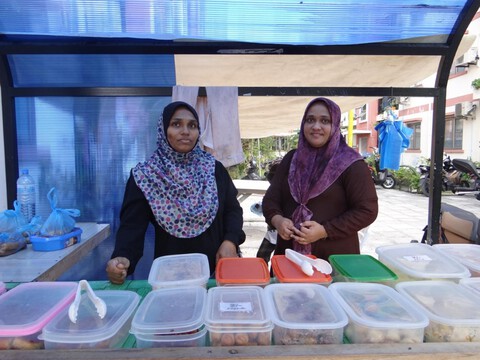
As an answer to Male’s housing problems, the Government of Maldives looked to Hulhumale – a reclaimed island located in the same Atoll. One part of the island has been dedicated to social housing, where the Government has allotted spacious, three-bedroom apartments to hand-picked the awardees from a long list of applications.
Fathimath Yasmin and her family received a home, a year ago, through this Government offering. She shared that the Government has stipulated a monthly rent of MVR 7000 on the housing, for the next 25 years. After which, the apartment will be legally transferred to Yasmin’s family.
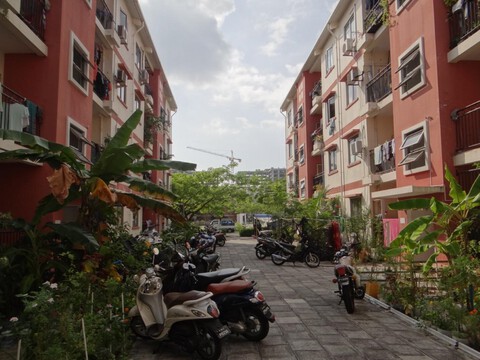
To promote business and livelihoods in the area, the Government has also built basic shop shelters at each housing block. These shops have been allocated solely for the sale of food stuffs- evening snacks that ever so popular in Maldives. So, around seven months ago, Fathimath and members of her extended family registered and were allotted the shop shelter in their block for an annual fee of MVR 150.
Starting from the wee hours of the morning, Yasmin and her family members stand around the table at her home and make 11 food items, including, samosas and fish balls. Sales, at the stall, start at 3.30 pm and last till sun down. And while Yasmin is happy with the initial response – the stall makes around MVR 15000 a month - she says competition from the nearby stalls is stiff and she hopes that she will be able to sustain the business over a long term.
Organisation affiliated with: Not Affiliated.
Case Study 6
After spending most of their lives in Male, 67-year-old Fathimath and her family moved to Hulhumale when they were allotted an apartment in the Government’s social housing project. Once they relocated here, Fathimath’s husband had to restart his baking business but given Male’s high rents, the family thought that they would be better off in their new home despite the hardships that they would face in re-establishing themselves in a new environment.
Fathimath’s three-bedroom home has been allotted by the Government for MVR 7000 a month for 25 years. After this period, the property will be transferred to Fathimath’s family. From their new home, Fathimath and two of her six daughters, who refused to be photographed in adherence to their religious beliefs, have started a home-based, food processing unit.
Fathimath toils over giant mixers and grinders that occupy a better part of their living room. She makes fish masala – grinding together onion, ginger, cumin, pepper, hot chillies, lime and other spices. She also churns out packets of potato chips, coconut shavings and spice mixes. These are sold in the neighbourhood – amongst customers and to local shops. They also send their products for sale in other islands.
Working through the day, from 6am to 6pm, means standing on her feet all through her work hours and this, Fathimath says has caused a lot of leg pain. However, she says that she cannot stop working even though she is on the Government’s old age pension. Her earning from food processing, she says, is crucial to keeping the family afloat and she hopes to continue for as long as she can.
Organisation affiliated with: Not Affiliated.

